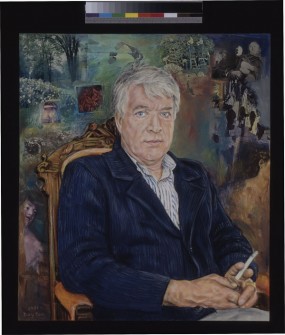
Portrait of Timothy Findley by Alan Dayton, 1991. Alan Dayton, Library and Archives Canada, archival reference number R11811-0-X-E, c151875k-v6
The Wars, which won the Governor General’s Award for Fiction in 1977, is an example of what influential Canadian literature critic and theorist Linda Hutcheon terms historiographic metafiction. Hutcheon defines metafiction as “fiction which is … self-reflective and auto-representational” (228). According to Hutcheon, it “thematizes its own interaction both with the historical past and with the historically conditioned expectations of its readers” (231). Historiographic metafiction, then, attempts to make the reader aware of how “History … is made by its writer, even if the events seem to speak for themselves” (231–32). The Wars, unlike some other accounts of Canada’s involvement in World War I, does not romanticize Canada’s role in the war to end all wars, but rather attempts to make readers aware of how such idealizations happened. The Wars was also, and not coincidently, the first major Canadian historical novel about World War I written by someone who had not participated in it.
Questions to Keep in Mind While Reading
For help with critical reading, see Close Reading Prose.
- Consider figures of authority and Robert Ross’ responses to them. What do these moments and figures reveal about his own mental state? Do these responses suggest critiques of these figures?
- How does Ross’ sister, Rowena, and the animals connected to her, inform the narrative? When is important information revealed about her, and how does this connect to the content of the novel surrounding this revelation?
- This book explores in detail the connections between violence, violation, animality, sexuality, self-expression, and individuality. What key images or scenes suggest ways in which these aspects connect?
Works Cited
- Findley, Timothy. The Wars. 1977. Toronto: Penguin, 1978. Print.
- Hutcheon, Linda.
Canadian Historiographic Metafiction.
Essays on Canadian Writing 30 (1984): 228–38. Web. 13 Aug. 2013.








 ©
©